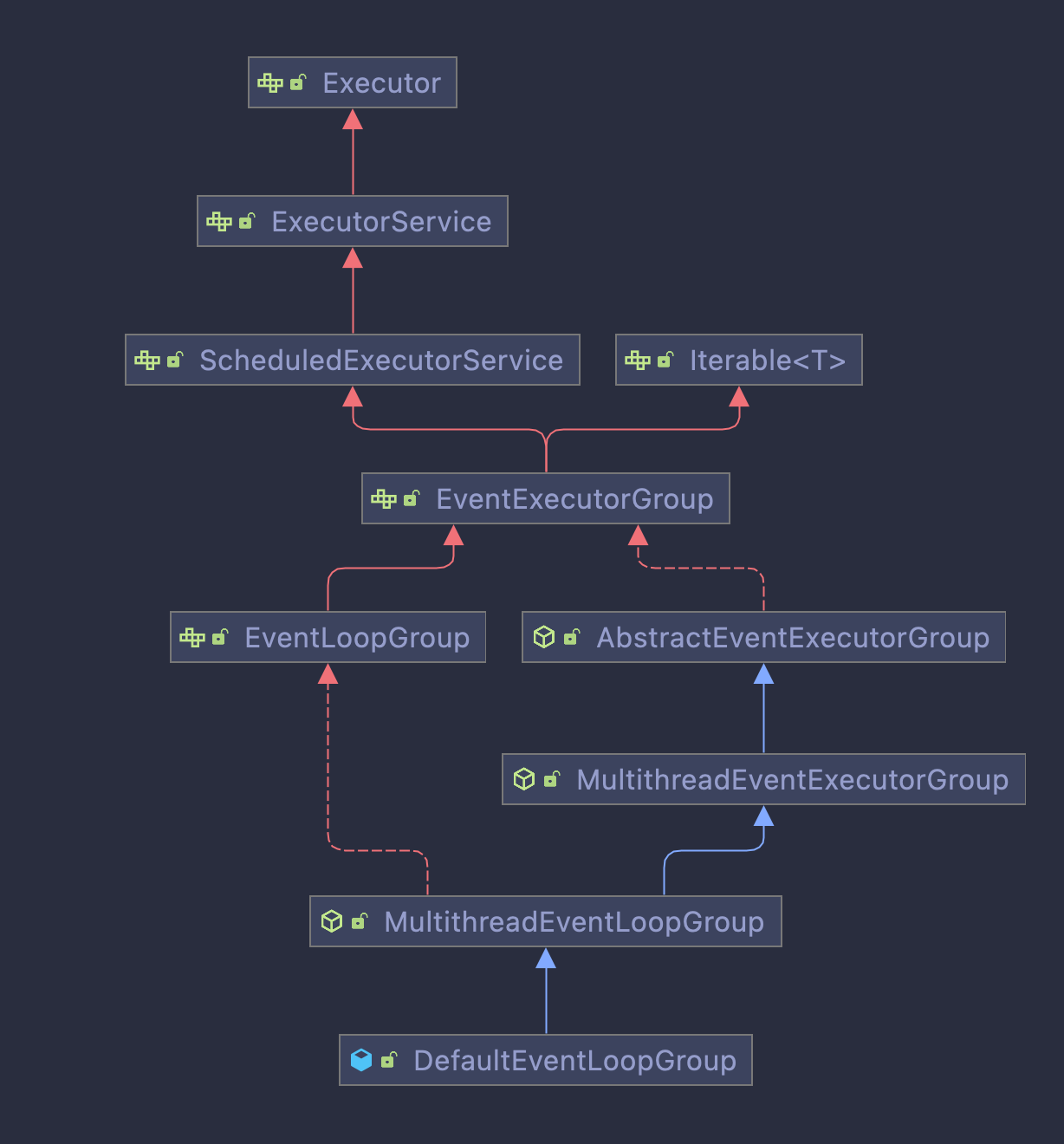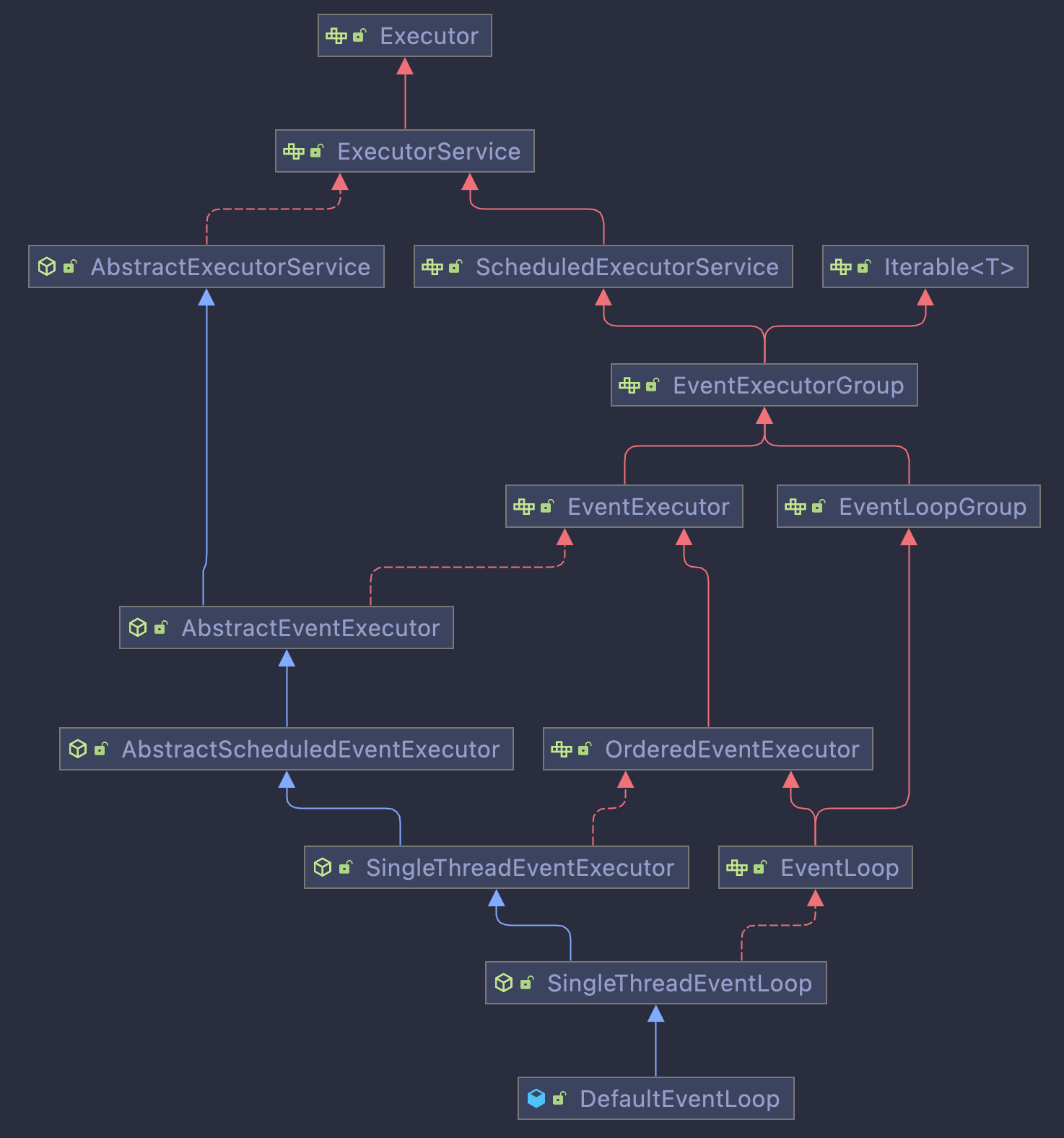13. netty系列之:EventLoop,EventLoopGroup和netty的默认实现
简介
在netty中不管是服务器端的ServerBootstrap还是客户端的Bootstrap,在创建的时候都需要在group方法中传入一个EventLoopGroup参数,用来处理所有的ServerChannel和Channel中所有的IO操作和event。
可能有的小伙伴还稍微看了一下netty的源码,可能会发现还有一个和EventLoopGroup非常类似的类叫做EventLoop。那么EventLoopGroup和EventLoop有什么关系呢?他们的底层和channel的交互关系是怎么样的呢?一起来看看吧。
EventLoopGroup和EventLoop
EventLoopGroup继承自EventExecutorGroup:
public interface EventLoopGroup extends EventExecutorGroup
在前面的文章中我们讲过,EventExecutorGroup中有一个next方法可以返回对应的EventExecutor,这个方法在EventLoopGroup中进行了重写:
EventLoop next();
next方法返回的不再是一个EventExecutor,而是一个EventLoop。
事实上,EventLoop和EventLoopGroup的关系与EventExecutor和EventExecutorGroup的关系有些类似,EventLoop也是继承自EventLoopGroup,EventLoopGroup是EventLoop的集合。
public interface EventLoop extends OrderedEventExecutor, EventLoopGroup
在EventLoopGroup中,除了重写的next方法之外,还添加了channel的注册方法register,用于将channel和注册到EventLoop中,从而实现channel和EventLoop的绑定。
ChannelFuture register(Channel channel);
在EventLoop中,自多添加了一个parent方法,用来表示EventLoop和EventLoopGroup的关联关系:
EventLoopGroup parent();
EventLoopGroup在netty中的默认实现
EventLoopGroup在netty中的默认实现叫做DefaultEventLoopGroup,先来看一下它的继承关系:

如果看了之前我讲解的关于EventExecutorGroup的朋友可以看出来,DefaultEventLoopGroup和DefaultEventExecutorGroup的继承关系是很类似的,DefaultEventLoopGroup继承自MultithreadEventLoopGroup,而MultithreadEventLoopGroup又继承自MultithreadEventExecutorGroup并且实现了EventLoopGroup接口:
public abstract class MultithreadEventLoopGroup extends MultithreadEventExecutorGroup implements EventLoopGroup
MultithreadEventLoopGroup是用多线程来处理Event Loop。
在MultithreadEventLoopGroup中定义了一个DEFAULT_EVENT_LOOP_THREADS来存储默认的处理Event Loop线程的个数:
DEFAULT_EVENT_LOOP_THREADS = Math.max(1, SystemPropertyUtil.getInt(
"io.netty.eventLoopThreads", NettyRuntime.availableProcessors() * 2));
对于EventLoopGroup中新加的几个register方法,MultithreadEventLoopGroup都是调用对应的next方法来实现的:
public ChannelFuture register(Channel channel) {
return next().register(channel);
}
这里的next()方法的实现实际上调用的是父类的next方法,也就是MultithreadEventExecutorGroup中的next方法,来选择Group管理的一个EventLoop:
public EventLoop next() {
return (EventLoop) super.next();
}
对于DefaultEventLoopGroup来说,它继承自MultithreadEventLoopGroup,实现了一个newChild方法,用来将传入的executor封装成为EventLoop:
protected EventLoop newChild(Executor executor, Object... args) throws Exception {
return new DefaultEventLoop(this, executor);
}
EventLoop在netty中的默认实现
EventLoop在netty中的默认实现叫做DefaultEventLoop,先来看下它的继承关系:

DefaultEventLoop继承自SingleThreadEventLoop,而SingleThreadEventLoop又继承自SingleThreadEventExecutor并且实现了EventLoop接口。
先来看下SingleThreadEventLoop的实现:
public abstract class SingleThreadEventLoop extends SingleThreadEventExecutor implements EventLoop
SingleThreadEventLoop使用单一线程来执行提交的任务。它和SingleThreadEventExecutor相比有什么变化呢?
首先 提供了一个tailTasks用来存储pending的tasks:
private final Queue<Runnable> tailTasks;
这个tailTasks会被用在任务个数的判断和操作上:
final boolean removeAfterEventLoopIterationTask(Runnable task) {
return tailTasks.remove(ObjectUtil.checkNotNull(task, "task"));
}
protected boolean hasTasks() {
return super.hasTasks() || !tailTasks.isEmpty();
}
public int pendingTasks() {
return super.pendingTasks() + tailTasks.size();
}
SingleThreadEventLoop中对register方法的实现最终调用的是注册的channel中unsafe的register方法:
channel.unsafe().register(this, promise);
再来看一下DefaultEventLoop,DefaultEventLoop继承自SingleThreadEventLoop:
public class DefaultEventLoop extends SingleThreadEventLoop
除了构造函数之外,DefaultEventLoop实现了一个run方法,用来具体任务的执行逻辑:
protected void run() {
for (;;) {
Runnable task = takeTask();
if (task != null) {
task.run();
updateLastExecutionTime();
}
if (confirmShutdown()) {
break;
}
}
}
如果对比可以发现,DefaultEventLoop和DefaultEventExecutor中run方法的实现是一样的。
总结
本文介绍了netty中EventLoop和EventLoopGroup的默认实现:DefaultEventLoop和DefaultEventLoopGroup,但是不知道小伙伴们有没有发现,即使在最简单的netty应用中也很少看到这两个默认的EventLoop。最常用的反而是NioEventLoopGroup和NioEventLoop,这是因为DefaultEventLoop和DefaultEventLoopGroup只是使用了多线程技术,一个线程代表一个EventLoop,在EventLoop过多的情况下可能会造成线程和性能的浪费,所以在NioEventLoopGroup和NioEventLoop使用了NIO技术,通过使用channel、selector等NIO技术提升了EventLoop的效率。关于NioEventLoopGroup和NioEventLoop的详细介绍,我们会在后一章中详细讲解,敬请期待。
点我查看更多精彩内容:www.flydean.com

